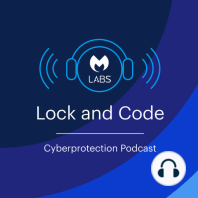41 min listen
Meet the entirely legal, iPhone-crashing device: the Flipper Zero
FromLock and Code
ratings:
Length:
36 minutes
Released:
Dec 17, 2023
Format:
Podcast episode
Description
It talks, it squawks, it even blocks! The stocking-stuffer on every hobby hacker’s wish list this year is the Flipper Zero.“Talk” across low-frequency radio to surreptitiously change TV channels, emulate garage door openers, or even pop open your friend’s Tesla charging port without their knowing! “Squawk” with the Flipper Zero’s mascot and user-interface tour guide, a “cyber-dolphin” who can “read” the minds of office key fobs and insecure hotel entry cards. And, introducing this year, block iPhones running iOS 17!No, really, this consumer-friendly device can crash iPhones, and in the United States, it is entirely legal to own.The Flipper Zero is advertised as a “multi-tool device for geeks.” It’s an open-source tool that can be used to hack into radio protocols, access control systems, hardware, and more. It can emulate keycards, serve as a universal remote for TVs, and make attempts to brute force garage door openers.But for security researcher Jeroen van der Ham, the Flipper Zero also served as a real pain in the butt one day in October, when, aboard a train in the Netherlands, he got a popup on his iPhone about a supposed Bluetooth pairing request with a nearby Apple TV. Strange as that may be on a train, van der Ham soon got another request. And then another, and another, and another.In explaining the problem to the outlet Ars Technica, van der Ham wrote:“My phone was getting these popups every few minutes and then my phone would reboot. I tried putting it in lock down mode, but it didn’t help.”Later that same day, on his way back home, once again aboard the train, van der Ham noticed something odd: the iPhone popups came back, and this time, he noticed that his fellow passengers were also getting hit.What van der Ham soon learned is that he—and the other passengers on the train—were being subjected to a Denial-of-Service attack, which weaponized the way that iPhones receive Bluetooth pairing requests. A Denial-of-Service attack is simple. Essentially, a hacker, or more commonly, an army of bots, will flood a device or a website with requests. The target in these attacks cannot keep up with the requests, so it often locks up and becomes inaccessible. That can be a major issue for a company that is suffering from having its website attacked, but it’s also dangerous for everyday people who may need to use their phones to, say, document something important, or reach out to someone when in need.In van der Ham’s case, the Denial-of-Service attack was likely coming from one passenger on the train, who was aided by the small, handheld device, the Flipper Zero.Today, on the Lock and Code podcast, with host David Ruiz, we speak with Cooper Quintin, senior public interest technologist with Electronic Frontier Foundation—and Flipper Zero owner—about what the Flipper Zero can do, what it can’t do, and whether governments should get involved in the regulation of the device (that’s a hard “No,” Quintin said).“Governments should be welcoming this device,” Quintin said. “Every government right now is saying, ‘We need more cyber security capacity. We need more cyber security researchers. We got cyber wars to fight, blah, blah, blah,’ right?”Quintin continued:“Then, when you make this amazing tool that is, I think, a really great way for people to start interacting with cybersecurity and getting really interested in it—then you ban that?”Tune in today.You can also find us on Apple Podcasts,
Released:
Dec 17, 2023
Format:
Podcast episode
Titles in the series (100)
Tracking the charities that track you online with Chris Boyd by Lock and Code
